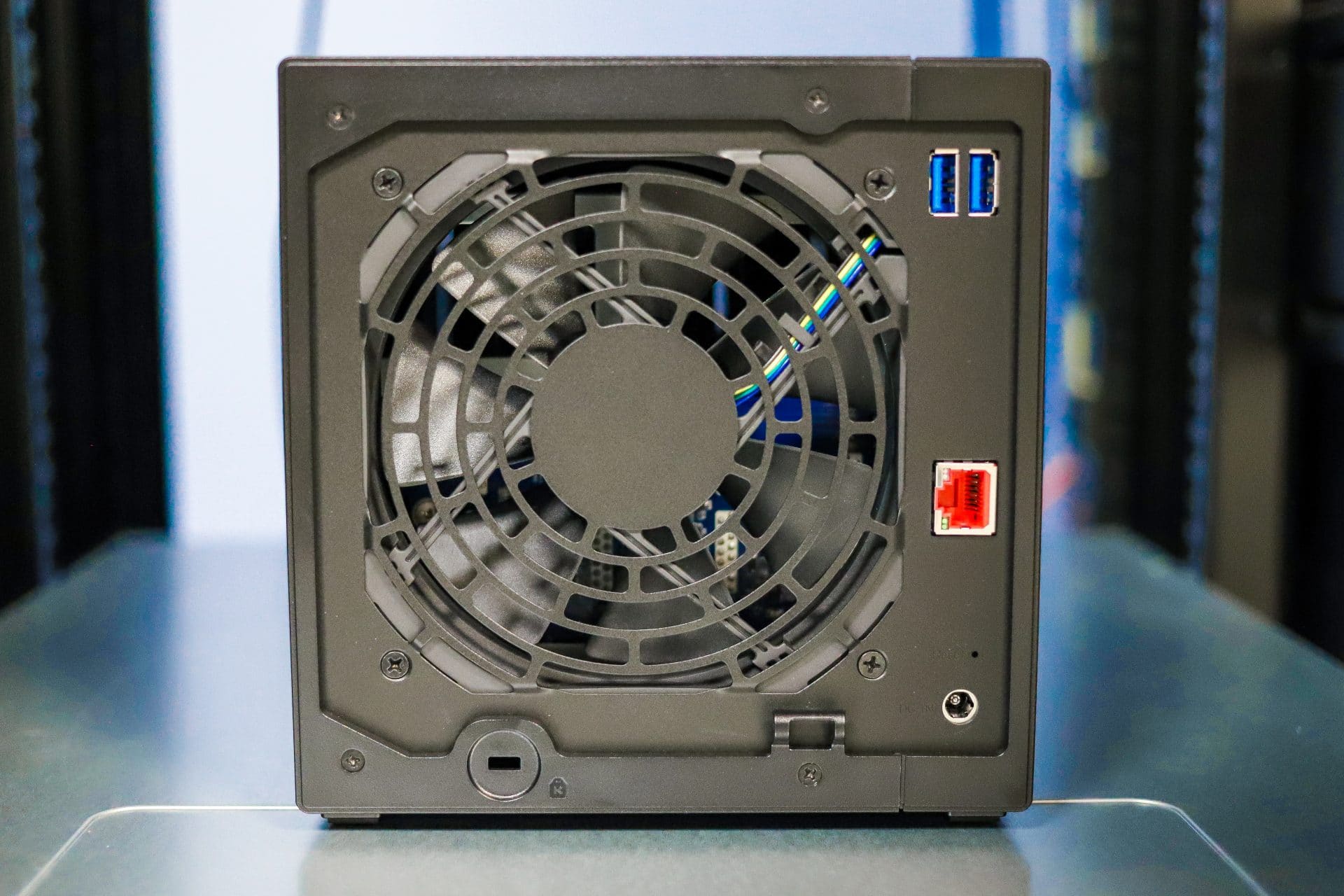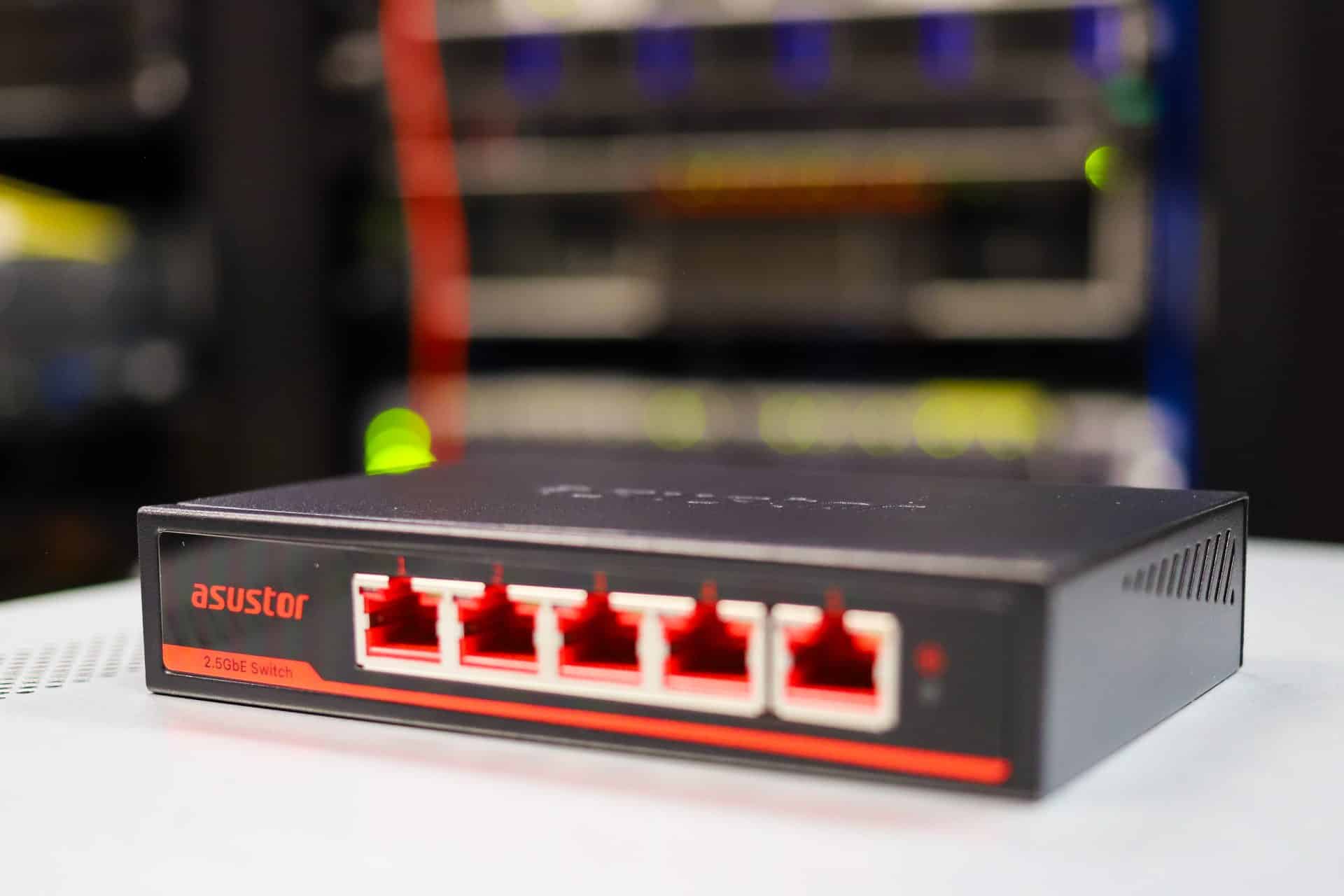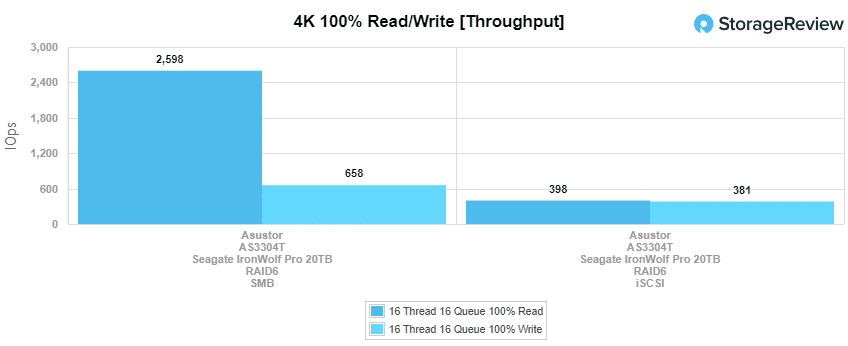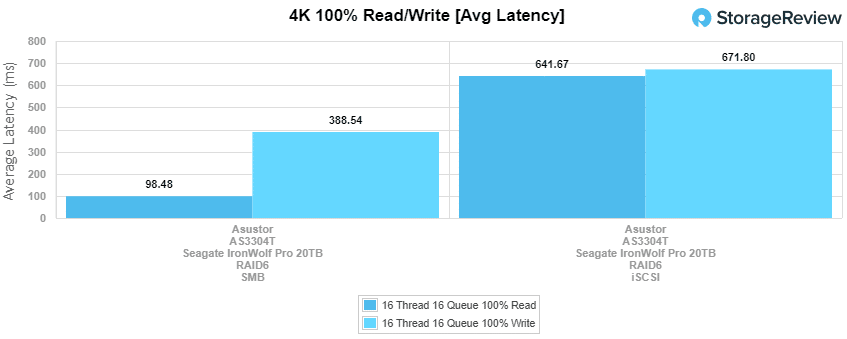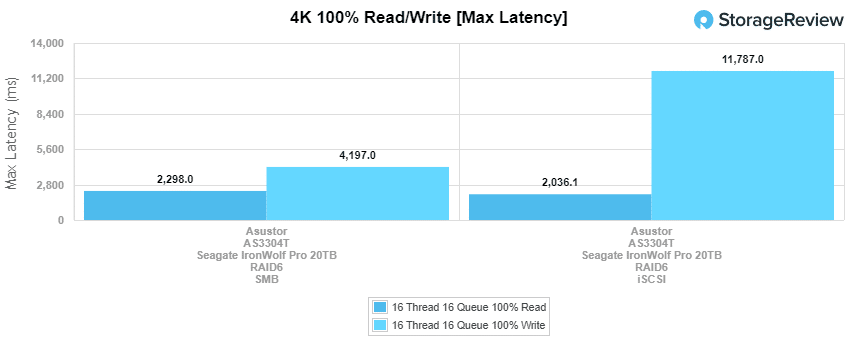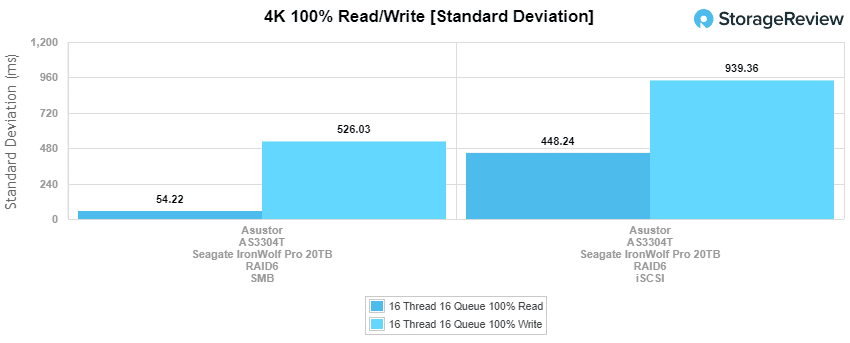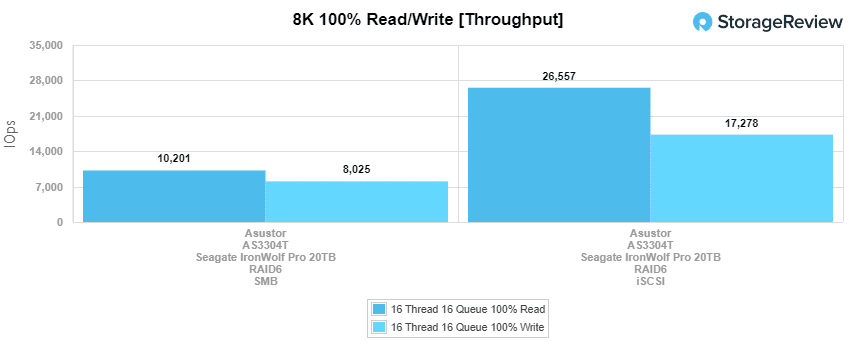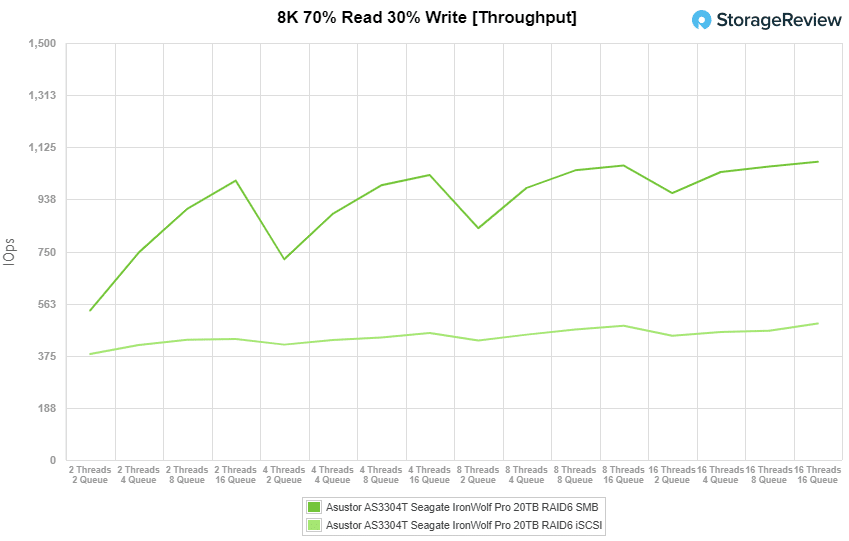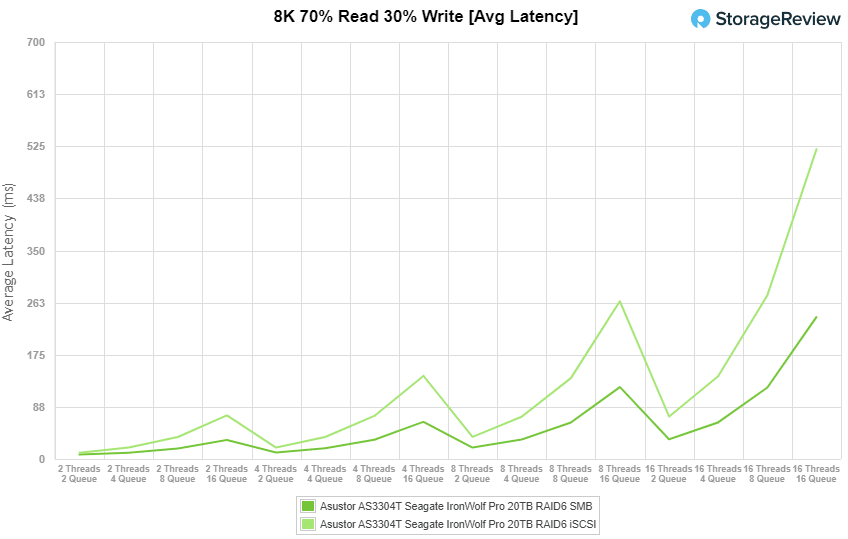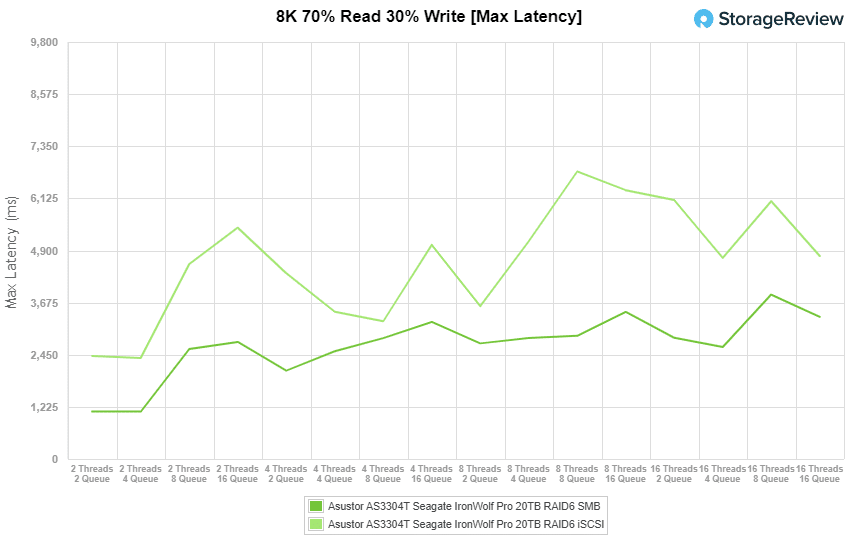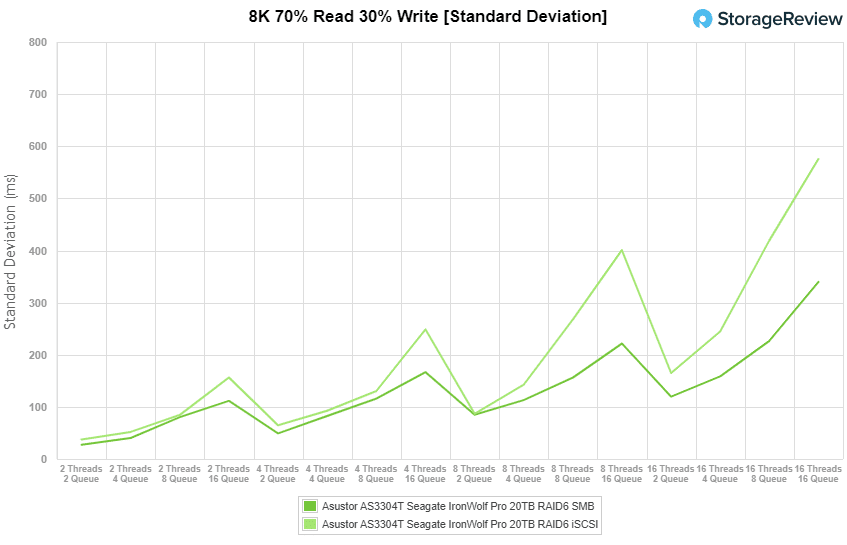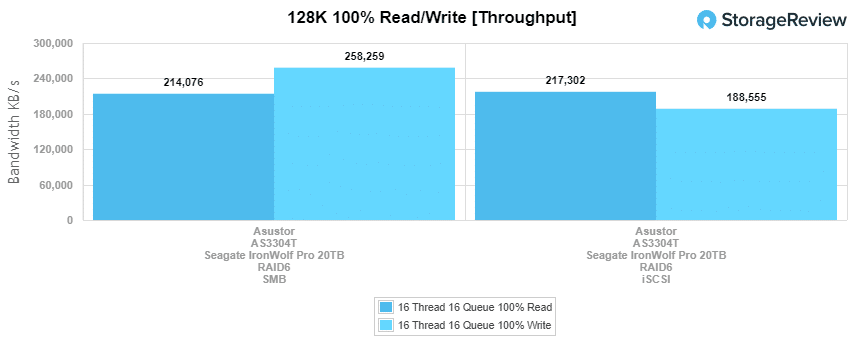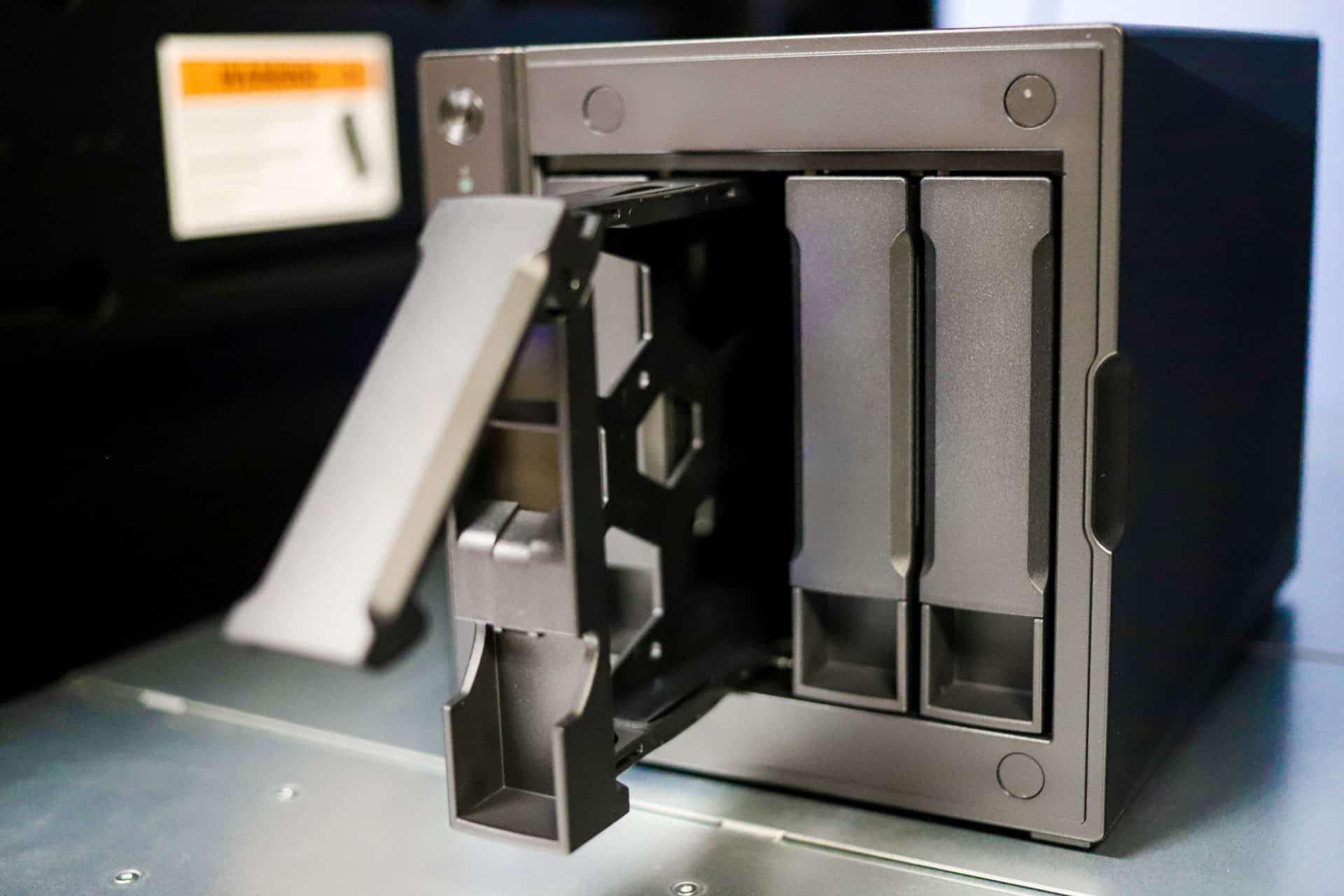The DRIVESTOR 4 Pro is one of the newest NAS devices to the Asustor portfolio. The DRIVESTOR 4 Pro is a compact 4-bay NAS with a small footprint that can fit in any office or home setting. The DRIVESTOR comes with three USB 3.2 Gen 1 ports, along with possibly the most important feature, a 2.5Gb RJ-45 Ethernet Port. The DRIVESTOR 4 Pro is one of the newest NAS devices to the Asustor portfolio. The DRIVESTOR 4 Pro is a compact 4-bay NAS with a small footprint that can fit in any office or home setting. The DRIVESTOR comes with three USB 3.2 Gen 1 ports, along with possibly the most important feature, a 2.5Gb RJ-45 Ethernet Port.
As we have stated in other reviews for NAS devices, with everything that is still going on in the world and people are still working from home, NAS’s are so vital in the business world right now. Cloud services can only go so far before a paywall goes up or max storage is reached, and with a NAS, having the ability to store data physically is usually more comforting than possibly having someone breach a cloud service.
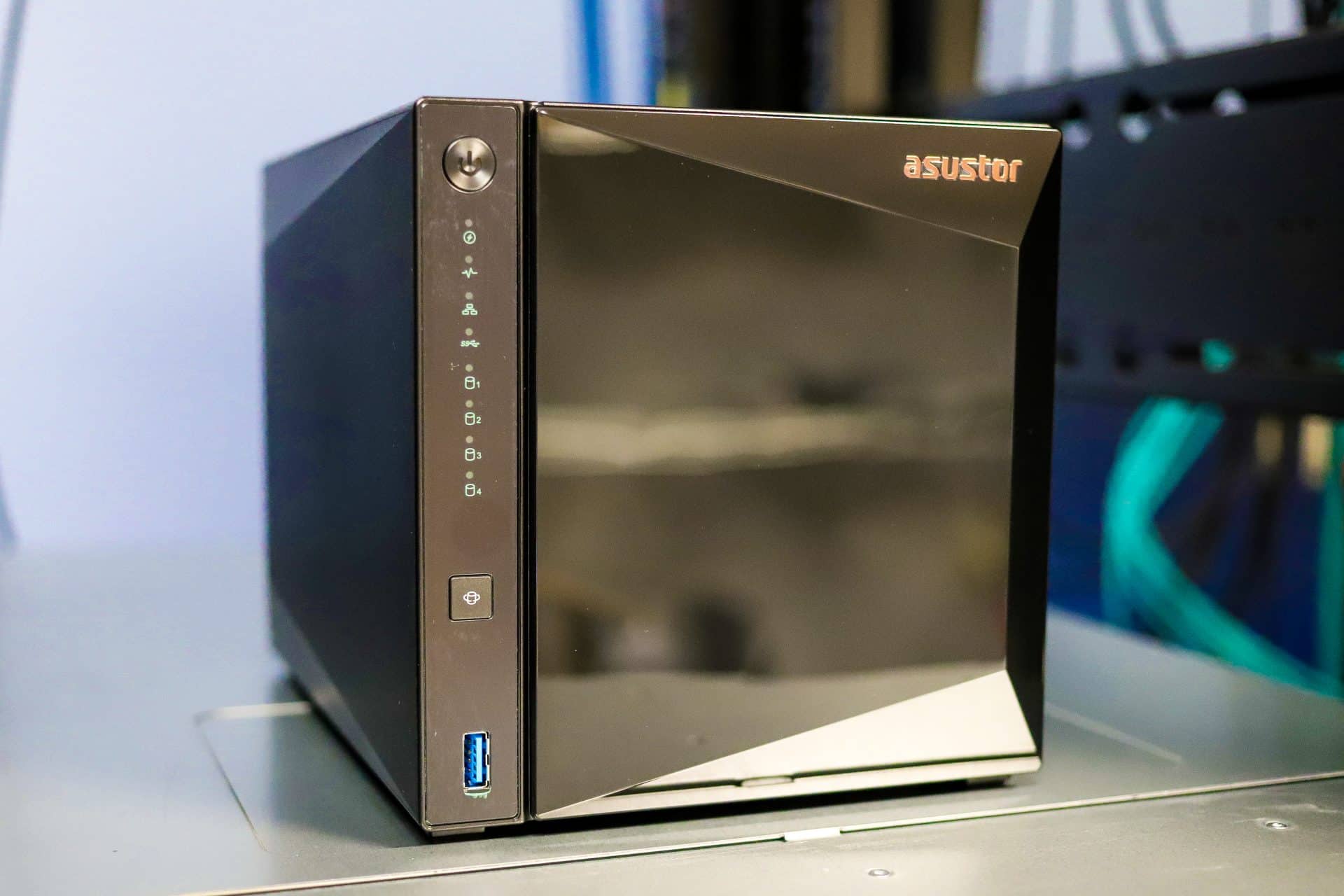
Asustor’s DRIVESTOR 4 Pro is a niche option for those wanting a NAS. There is competition out there like the Synology DS920+, although more money, does have a more reputable brand name behind NAS devices. However, what the DRIVESTOR 4 Pro is selling is 2.5Gb Ethernet Port. There aren’t many inexpensive NAS devices that support 2.5Gb Ethernet, which is where the DRIVESTOR 4 Pro comes in. There are sacrifices in order to have a 2.5Gb port, for instance, it doesn’t have support for an M.2 drive, nor does it have the fastest CPU on the market. It is important to keep the pros and cons in mind while looking at NAS’s.
Behind the DRIVESTOR 4 Pro is the all-new ASUSTOR Data Master (ADM) 4.0. ADM 4.0 is the operating system that this NAS runs on, and with the release of the DRIVESTOR 4 Pro, Asustor was able to implement the newest version along with it. ADM 4.0 introduces a new login page and a better UI, which offers a more aesthetically pleasing home page that is easy to navigate. ADM 4.0 also has new improvements to performance and better security as the new version of OpenSSL plugs vulnerabilities found in previous versions.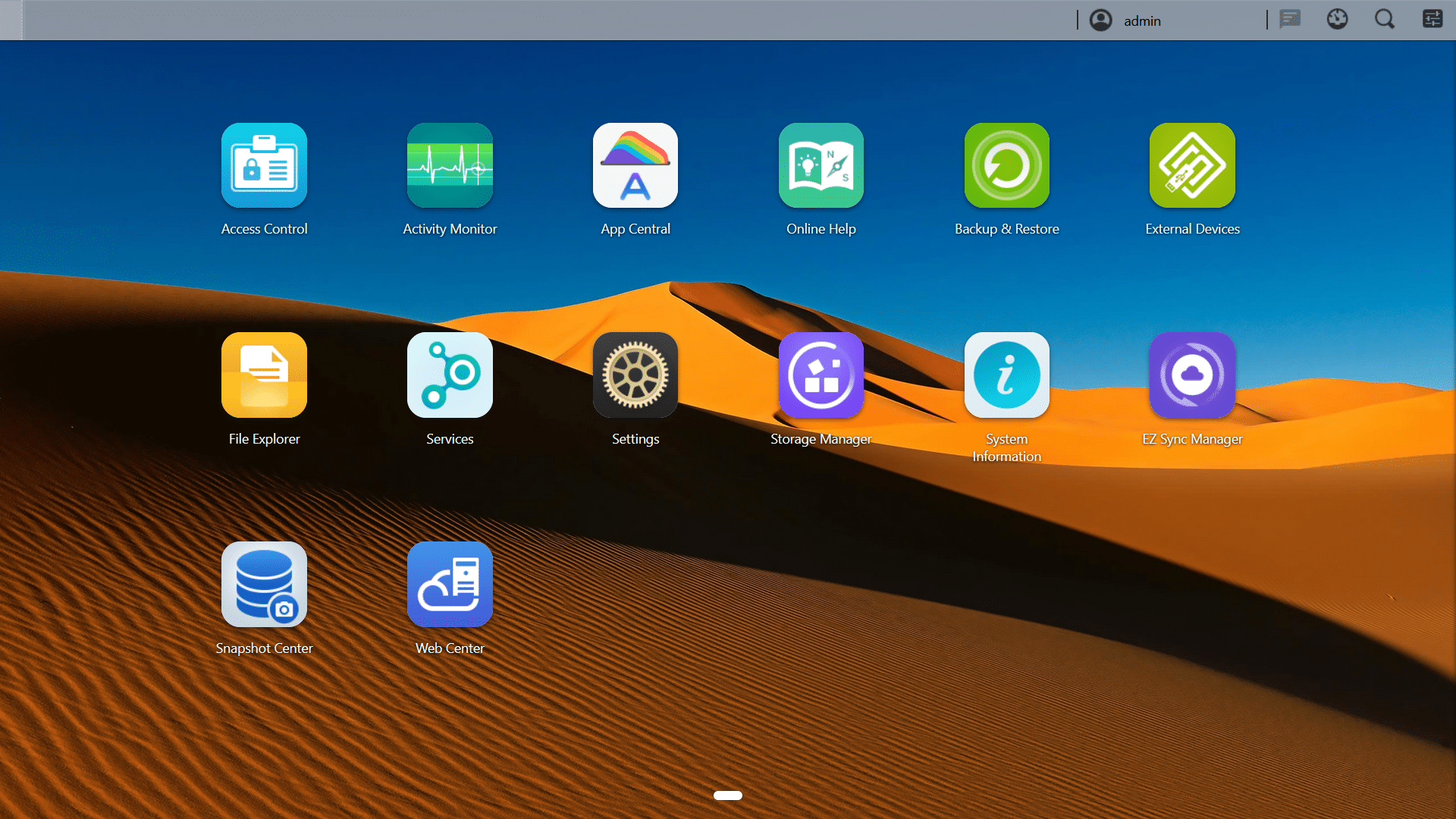
The DRIVESTOR 4 Pro is designed for higher performance connectivity, with support of 2.5Gb speed. It is important to keep in mind that other devices need to also support 2.5Gb speeds. This is why Asustor also sells switch’nstor ASW205T, a 5-port 2.5GbE switch.
The base Asustor DRIVESTOR 4 Pro is available at Amazon for $329.99 and the switch’nstor ASW205T is also available at Amazon for $119.00.
ASUSTOR DRIVESTOR 4 Pro Specifications
| Component | Description |
| CPU | Realtek RTD1296 1.4 GHz Quad-Core |
| Memory | 2GB DDR4 |
| Storage | Four Drive Bays |
| Compatible Drive Types | 3.5″ SATA HDD2.5″ SATA HDD
2.5″ SATA SSD |
| Hot-swappable | Yes |
| External Ports | One RJ-45 2.5GbE PortOne USB 3.2 Gen 1 Port (Front)
Two USB 3.2 Gen 1 Port (Rear) |
| Power | 90W AC Adapter |
| Operation/Disk Hibernation/Sleep Mode(S3) | 23.1W / 10.1W / No Sleep Mode |
| Dimensions | 170mm x 174mm x 230mm |
| Warranty | 3 Years |
ASUSTOR DRIVESTOR 4 Pro Design and Build
The Asustor DRIVESTOR 4 Pro is on the smaller side for a four-bay NAS. The bays take up about 90% of the front, with the power button, system status LED indicators, and one of the USB 3.2 Gen 1 ports. Similar to their other NAS devices, Asustor has made a cover for the bays that offers a geometric design fitted with magnets. This simple cover gives the NAS a sense of personality so it doesn’t look out of place when deployed.
When viewing the rear of the DRIVESTOR 4 Pro, it has one fan to cool all four drives, the other two USB 3.2 Gen 1 ports, the 2.5G RJ-45 port, reset button, DC power input, and a K-Lock. It would have been nice to possibly see two fans, however, to keep the NAS as compact as possible, Asustor opted for one fan instead.
ASUSTOR Switch’nstor ASW205T
Along with the DRIVESTOR 4 Pro, Asustor was kind enough to also send their switch’nstor ASW205T. This is small 5 port switch offers fast connections with 2.5-Gigabit Ethernet. Asustor sent this switch because they wanted to show that by combining these products, it offers outstanding connections speeds without any bottlenecks. Because the ASW205T uses normal RJ-45 Ethernet ports, it also offers a wide range of compatibility, supporting a 1Gb connection with CAT 5e cabling.
The ASW205T is silent and fanless, which allows for deployment in any environment seamlessly. The design and build on the ASW205T is only 14 cm long and weighs 340 g, making this a fast compact switch. This switch also has the ability to be mounted almost anywhere with the included mounting points on the bottom.
ASUSTOR DRIVESTOR 4 Pro Performance
Configuration
We configured the Asustor DRIVESTOR 4 Pro in RAID6 using four Seagate IronWolf Pro 20TB HDDs for our testing. Each disk configuration used SMB and iSCSI configurations.
Enterprise Synthetic Workload Analysis
Our enterprise shared storage and hard drive benchmark process preconditions each drive into steady-state with the same workload the device will be tested with under a heavy load of 16 threads with an outstanding queue of 16 per thread, and then tested in set intervals in multiple thread/queue depth profiles to show performance under light and heavy usage. Since NAS solutions reach their rated performance level very quickly, we only graph out the main sections of each test.
Preconditioning and Primary Steady-State Tests:
- Throughput (Read+Write IOPS Aggregate)
- Average Latency (Read+Write Latency Averaged Together)
- Max Latency (Peak Read or Write Latency)
- Latency Standard Deviation (Read+Write Standard Deviation Averaged Together)
Our Enterprise Synthetic Workload Analysis includes four profiles based on real-world tasks. These profiles have been developed to make it easier to compare to our past benchmarks as well as widely-published values such as max 4k read and write speed and 8k 70/30, which is commonly used for enterprise drives.
- 4K
- 100% Read or 100% Write
- 100% 4K
- 8K 70/30
- 70% Read, 30% Write
- 100% 8K
- 8K (Sequential)
- 100% Read or 100% Write
- 100% 8K
128K (Sequential)
- 100% Read or 100% Write
First up are the enterprise workloads, where we measured a long sample of random 4K performance with 100% write and 100% read activity. For IOPS, the DRIVESTOR 4 Pro gave us SMB scores of 2,598 IOPS read and 658 IOPS write. iSCSI hit 398 IOPS read and 381 IOPS write.
For 4K average latency, SMB saw 98ms read and 389ms write, while iSCSI was 642ms read and 671ms write.
Max latency with 4K had SMB scores of 2,298ms read and 4,197ms write and iSCSI had 2,036ms read and 11,787ms write.
Our last 4K test was a standard deviation test that gave us 54ms read and 526ms write in SMB and 448ms read and 939ms write in iSCSI.
Our next benchmark measures 100% 8K sequential throughput with a 16 Thread 16 Queue load in 100% read and 100% write. Here, the DRIVESTOR 4 Pro was able to hit 10,201 IOPS read and 8,025 IOPS write in SMB as well as 26,557 IOPS read and 17,278 IOPS write in iSCSI.
Compared to the fixed 16 thread, 16 queue max workload we performed in the 100% 4K write test, our mixed workload profiles scale the performance across a wide range of thread/queue combinations. In these tests, we span workload intensity from 2 thread/2 queue up to 16 thread/16 queues. In throughput, the DRIVESTOR 4 Pro was fairly volatile in SMB starting at 538 IOPS and ending at 1073 IOPS. There was a fairly flat line from beginning to end in iSCSI with a start of 381 IOPS and an end at 491 IOPS.
For 8K 70/30 average latency, the SMB configuration started at 7ms and spiked up to 238ms at the end. The iSCSI started at 10ms and finished at a much higher 520ms.
With 8K 70/30 max latency, the SMB went from 1,117ms to 3,341ms and iSCSI went from 2,422ms to 4,771ms.
8K 70/30 standard deviation saw latency go from 27ms to 340ms in SMB and 37ms to 575ms in iSCSI.
The last synthetic benchmark is our 128K test, which is a large-block sequential test that shows the highest sequential transfer speed for a device. In this workload scenario, the SMB configuration saw speeds of 214MB/s read and 258MB/s write while iSCSI saw speeds of 217MB/s read and 189MB/s write. Here the advantage of the 2.5GbE interface really shined, allowing for higher performance from a single RJ45 connection than traditional 1GbE (or two).
Conclusion
The Asustor DRIVESTOR 4 Pro is a compact NAS that is all about fast connection with its 2.5Gb Ethernet port. Along with pairing alongside the Asustor switch’nstor ASW205T, anyone is able to access the DRIVESTOR 4 Pro with the full 2.5Gb connection. The DRIVESTOR 4 Pro leverages the Realtek RTD1296 quad-core process along with 2GB of DDR4 memory and although it doesn’t give the fastest speeds on transfers, it makes up for it in its compact design, small footprint and modest starting price.
For testing, we ran the HDDs in RAID6. For SMB configuration, we saw 4K throughput of 2,598 IOPS read and 658 IOPS write, 4K average latency of 98ms read and 389ms write, 4K max latency of 2,298ms read and 4,197ms write, 8K sequential of 10,201 IOPS read and 8,025 IOPS write, and finally, in 128K large block, it tested at 214MB/s read and 258MB/s write in SMB.
In iSCSI configurations we saw 4K throughput of 398 IOPS read and 381 IOPS write, 4K average latency of 642ms read and 671ms write, 4K max latency of 2,036ms read and 11,787ms write, 8K sequential of 26,557 IOPS read and 17,278 IOPS write, and finally in the 128K large block with 217MB/s read and 189MB/s write.
The DRIVESTOR 4 Pro was a NAS designed for maximizing consumer data transfer speeds. It performed alright, we have seen some other competition perform better, however for the price point of this NAS and the 2.5Gb RJ-45, it is a viable option. To note, in order to get the full use of the 2.5Gb Ethernet port, it must be paired with other devices that are capable of handling 2.5Gb speeds, which is why this NAS pairs well with the ASW205T. Overall, for the features, it does have a small footprint and a single 2.5Gb port, and a fairly low entry cost.
Asustor DRIVESTOR 4 Pro AS3304T Datasheet
Engage with StorageReview
Newsletter | YouTube | LinkedIn | Instagram | Twitter | Facebook | TikTok | RSS Feed

